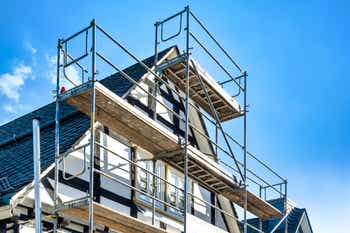Living in an old house can be a charming and unique experience, but it also comes with challenges, from outdated electrical systems to potential structural issues. That's why you must give your older home extra attention to ensure your family's safety and well-being. In this blog post, we'll explore essential safety tips and the importance of homeowners insurance when living in an old house.
What to Look for When Buying an Old House
When buying an old home, here are some things you should cross off your home maintenance checklist.
Conducting a Home Inspection
The first thing you should do is conduct a home inspection. Specifically, you should hire a specialized home inspector who thoroughly understands the construction and specific systems of older homes. Inspecting an old house vs. a new house may cost more, but it's a valuable investment to understand your property's condition and what needs to be done moving forward.
Reinforcing the Roof and Foundation
Older homes can be prone to structural issues due to wear and tear over the years, so regular inspection and maintenance are key to ensure your home's structural integrity and safety. Look for cracks in the walls, uneven floors, and a sagging roof, as all these signs could indicate underlying structural problems. If you notice any of these signs, contact a professional to help fix these issues. Also, consider installing gutter guards to keep debris away and prevent potential water damage that could further compromise the home's structure.
Updating Electrical Systems
You must prioritize electrical safety when living in an older home. Outdated wiring systems can lead to electrical fires, so it's crucial to have a professional electrician inspect the electrical system and make necessary upgrades. You can help minimize this hazard by replacing old or frayed wiring, upgrading electrical panels, and installing ground fault circuit interrupters (GFCIs) in areas prone to moisture, such as kitchens and bathrooms. It's also important to avoid overloading circuits by spreading out high-powered appliances and gadgets throughout the house.
Addressing Plumbing and Water Issues
If you live in an older house, keep an eye on your plumbing system. Outdated pipes can cause leaks, water damage, mold, and even contamination. Inspect your water pipes, faucets, and toilets regularly for any signs of corrosion or leaks. If you notice any problems, replace them as soon as possible to prevent any further damage. Additionally, if you suspect that your old house has lead pipes, consider testing the water for lead content and ensure your water is safe for drinking. Lastly, installing water-saving devices can help conserve water and reduce the strain on your plumbing system.
Mitigating Fire Hazards
Fire safety is a concern in any home, but it becomes even more important in older houses because they may be made of outdated insulation and materials that are easier to catch fire. Plus, your home might have outdated safety features or a lack of them. Here are some fire safety tips you should consider when living in an older home:
- Ensure your home is equipped with smoke detectors on every floor, including the basement (if you have one).
- Test your smoke detectors regularly and replace batteries as needed.
- Install fire extinguishers in easily accessible locations, such as the kitchen and garage.
- Develop a fire escape plan and practice it with your family members to ensure everyone knows what to do in case of an emergency.
- Be cautious when using fireplaces or wood-burning stoves.
- Have a professional clean and inspect your chimney annually.
Managing Lead Paint and Asbestos
Lead paint and asbestos are some of the most common hazards involving older homes. Lead paint was often used for interior decorating until the federal government banned it in 1978, while asbestos was used for insulation, wall patching, and other construction tasks until the 1970s. If your old home was built before these times, your family may be exposed to these dangerous materials. Hire a professional contractor specializing in lead paint and asbestos removal to ensure you and your family live in a safe environment.
Installing Security Measures
Your old home may also have outdated security features — e.g., doors, locks, windows, etc. — that can make it easy for burglars to invade your property. You can significantly reduce the risk of break-ins and theft by installing robust home security measures such as deadbolt locks, security doors, and reinforced windows. These measures also act as a visible deterrent, making it less appealing for potential intruders to target the property.
Maintaining Records and Documenting Improvements
It's important to keep documentation of any improvements made to your older home. This will be useful in case of a disaster or damage, as a comprehensive record of home improvements can help speed up the insurance claim process. Additionally, documenting improvements can also help increase the home's appraised value when it's time to sell, potentially leading to a higher selling price.
Importance of Homeowners Insurance for Old Homes
Since living in an older home comes with its fair share of potential risks and challenges, getting homeowners insurance is essential to protect your family, property, and belongings. While policies can differ from insurer to insurer, the benefits of home insurance typically include:
- Dwelling protection: Helps pay for the rebuilding or repair of your home’s physical structure due to a covered loss, such as fire, lightning, or smoke.
- Personal property: Helps repair or replace your belongings after a covered loss.
- Additional living expenses: Covers the cost of temporary housing and living expenses if your home becomes uninhabitable due to a covered loss.
- Personal liability protection: Helps pay for claims involving bodily injury or property damage that you caused.
- Guest medical protection: Helps pay for medical expenses for guests who accidentally injure themselves on your property.
Conclusion
By implementing these precautions, you can enjoy the character and history of your home while keeping yourself and your loved ones safe. And if you’re shopping for homeowners insurance, consider Mercury, where we can customize a policy that provides the right coverage to protect you and your older home.
Contact us for a fast, free homeowners insurance quote today!


